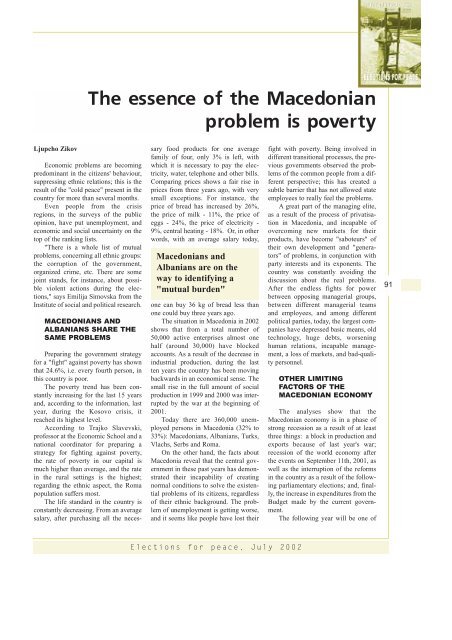Polyparty-ism - Search for Common Ground
Polyparty-ism - Search for Common Ground
Polyparty-ism - Search for Common Ground
Create successful ePaper yourself
Turn your PDF publications into a flip-book with our unique Google optimized e-Paper software.
The essence of the Macedonian<br />
problem is poverty<br />
Ljupcho Zikov<br />
Economic problems are becoming<br />
predominant in the citizens' behaviour,<br />
suppressing ethnic relations; this is the<br />
result of the "cold peace" present in the<br />
country <strong>for</strong> more than several months.<br />
Even people from the crisis<br />
regions, in the surveys of the public<br />
opinion, have put unemployment, and<br />
economic and social uncertainty on the<br />
top of the ranking lists.<br />
"There is a whole list of mutual<br />
problems, concerning all ethnic groups:<br />
the corruption of the government,<br />
organized crime, etc. There are some<br />
joint stands, <strong>for</strong> instance, about possible<br />
violent actions during the elections,"<br />
says Emilija Simovska from the<br />
Institute of social and political research.<br />
MACEDONIANS AND<br />
ALBANIANS SHARE THE<br />
SAME PROBLEMS<br />
Preparing the government strategy<br />
<strong>for</strong> a "fight" against poverty has shown<br />
that 24.6%, i.e. every fourth person, in<br />
this country is poor.<br />
The poverty trend has been constantly<br />
increasing <strong>for</strong> the last 15 years<br />
and, according to the in<strong>for</strong>mation, last<br />
year, during the Kosovo crisis, it<br />
reached its highest level.<br />
According to Trajko Slavevski,<br />
professor at the Economic School and a<br />
national coordinator <strong>for</strong> preparing a<br />
strategy <strong>for</strong> fighting against poverty,<br />
the rate of poverty in our capital is<br />
much higher than average, and the rate<br />
in the rural settings is the highest;<br />
regarding the ethnic aspect, the Roma<br />
population suffers most.<br />
The life standard in the country is<br />
constantly decreasing. From an average<br />
salary, after purchasing all the necessary<br />
food products <strong>for</strong> one average<br />
family of four, only 3% is left, with<br />
which it is necessary to pay the electricity,<br />
water, telephone and other bills.<br />
Comparing prices shows a fair rise in<br />
prices from three years ago, with very<br />
small exceptions. For instance, the<br />
price of bread has increased by 26%,<br />
the price of milk - 11%, the price of<br />
eggs - 24%, the price of electricity -<br />
9%, central heating - 18%. Or, in other<br />
words, with an average salary today,<br />
Macedonians and<br />
Albanians are on the<br />
way to identifying a<br />
"mutual burden"<br />
one can buy 36 kg of bread less than<br />
one could buy three years ago.<br />
The situation in Macedonia in 2002<br />
shows that from a total number of<br />
50,000 active enterprises almost one<br />
half (around 30,000) have blocked<br />
accounts. As a result of the decrease in<br />
industrial production, during the last<br />
ten years the country has been moving<br />
backwards in an economical sense. The<br />
small rise in the full amount of social<br />
production in 1999 and 2000 was interrupted<br />
by the war at the beginning of<br />
2001.<br />
Today there are 360,000 unemployed<br />
persons in Macedonia (32% to<br />
33%): Macedonians, Albanians, Turks,<br />
Vlachs, Serbs and Roma.<br />
On the other hand, the facts about<br />
Macedonia reveal that the central government<br />
in these past years has demonstrated<br />
their incapability of creating<br />
normal conditions to solve the existential<br />
problems of its citizens, regardless<br />
of their ethnic background. The problem<br />
of unemployment is getting worse,<br />
and it seems like people have lost their<br />
fight with poverty. Being involved in<br />
different transitional processes, the previous<br />
governments observed the problems<br />
of the common people from a different<br />
perspective; this has created a<br />
subtle barrier that has not allowed state<br />
employees to really feel the problems.<br />
A great part of the managing elite,<br />
as a result of the process of privatisation<br />
in Macedonia, and incapable of<br />
overcoming new markets <strong>for</strong> their<br />
products, have become "saboteurs" of<br />
their own development and "generators"<br />
of problems, in conjunction with<br />
party interests and its exponents. The<br />
country was constantly avoiding the<br />
discussion about the real problems.<br />
After the endless fights <strong>for</strong> power<br />
between opposing managerial groups,<br />
between different managerial teams<br />
and employees, and among different<br />
political parties, today, the largest companies<br />
have depressed basic means, old<br />
technology, huge debts, worsening<br />
human relations, incapable management,<br />
a loss of markets, and bad-quality<br />
personnel.<br />
OTHER LIMITING<br />
FACTORS OF THE<br />
MACEDONIAN ECONOMY<br />
The analyses show that the<br />
Macedonian economy is in a phase of<br />
strong recession as a result of at least<br />
three things: a block in production and<br />
exports because of last year's war;<br />
recession of the world economy after<br />
the events on September 11th, 2001, as<br />
well as the interruption of the re<strong>for</strong>ms<br />
in the country as a result of the following<br />
parliamentary elections; and, finally,<br />
the increase in expenditures from the<br />
Budget made by the current government.<br />
The following year will be one of<br />
91<br />
Elections <strong>for</strong> peace, July 2002

















